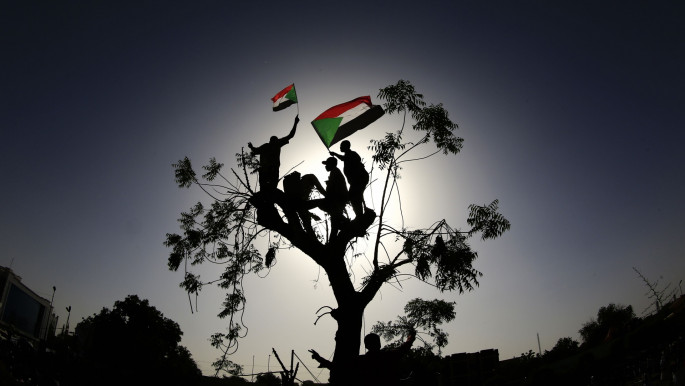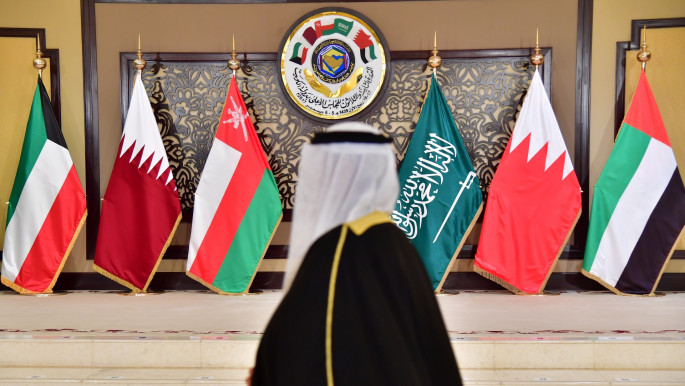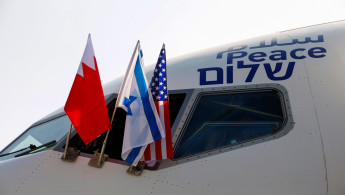Behind Bahrain's gamble on normalisation with Israel
The fact that the ruling Al Khalifa family decided to sign the Abraham Accords with Israel, despite the risk of exacerbating Bahrain's already volatile domestic political situation, confirms the importance of ensuring continued US support for Manama.
The role of Saudi Arabia and the UAE
Bahrain is often referred to as the "weakest link" among GCC states, with the economy and domestic divisions shaping Manama's dependence on Saudi and Emirati aid. Since 2011, Bahrain has agreed to two GCC-sponsored aid packages worth some $10 billion each.
The first bailout package was issued in the aftermath of Bahrain's 2011 uprising to offset popular discontent over the country's deteriorating economic situation, which was a key initial motivation behind the mass protests.
Once again, in 2018, Manama's volatile financial outlook prompted Saudi Arabia and the UAE, supported by Kuwait, to organise a second bailout for Bahrain. The archipelago kingdom's reliance on support from its GCC neighbours was also evident when Saudi Arabia's National Guard and UAE police entered the country to help Manama's Sunni-led government to crush the Shia-dominated uprising of 2011.
 |
Riyadh and Abu Dhabi's interests are almost certain to have factored into Bahrain's decision to join the Abraham Accords |  |
As such, Riyadh and Abu Dhabi's interests are almost certain to have factored into Bahrain's decision to join the Abraham Accords. When it comes to Saudi Arabia, despite mounting pressure from the US, Riyadh has so far refused to follow the UAE's footsteps and normalise its ties with Israel.
However, Bahrain's deal with Tel Aviv could not have come without Riyadh's green light, signalling that Saudi Arabia hopes that Bahrain can serve as a platform for future Saudi Arabia-Israel engagements and that Bahrain's participation in the accords satisfies Washington.
 |
|
| Read more: How US blackmail pushed Sudan to normalise ties with Israel |
The normalisation of Bahraini-Israeli relations also resulted from Abu Dhabi's increasing influence in Bahrain. Both the US and the UAE leadership have been keen for more Arab countries to normalise ties with Israel and have pressured Bahrain to join the UAE-Israel deal.
The UAE's strengthening hand in Bahrain has also pushed Manama towards aligning more closely with Abu Dhabi on other key regional dossiers. Crucially, Bahrain was the first GCC state to join the UAE in opposing Turkey's military involvement in Arab countries, Libya and Syria in particular.
The Iran factor
The Abraham Accords represent a far graver domestic risk for Bahrain than for the UAE. Compared to the UAE, Bahrain's King Hamad bin Isa Al Khalifa has to deal with a considerably more complicated and organised reality of pro-reform political opposition movements, particularly popular among the country's Shia majority. Some of the opposition's most intransigent elements have ties to Iran, which perceives GCC-Israel cooperation as a direct threat.
As a matter of fact, when Bahrain announced its normalisation deal with Israel, opposition groups organised six straight nights of protest, with demonstrators taking to the streets and chanting the slogan "Normalization is Betrayal." In addition, an array of civil society groups released a joint statement rejecting the agreement as it undermined the Palestinian cause.
 |
The Abraham Accords represent a far graver domestic risk for Bahrain than for the UAE |  |
Arguably, overall, Manama's participation in the Abraham Accords has made Bahrainis more prone than before to hold the ruling family accountable when it comes to bold foreign policy initiatives that lack popular support.
Such circumstances could offer Iran further opportunities to advance its interests in Bahrain by increasing its support for the country's opposition and promoting Tehran's image as the champion of the Palestinian cause among Bahrainis of all sects.
This is particularly worrying for the Al Khalifa royals who have perceived Tehran as a predatory threat even before the 1979 Islamic Revolution, and who have consistently witnessed attempts by the Islamic Republic to manipulate the struggle of Bahrain's Shia opposition to its own political advantage.
 |
|
| Read more: Biden as president: Winners and losers in the Gulf |
Indeed, while the UAE's decision to establish diplomatic relations with Israel sparked a more limited reaction from Tehran, normalisation between Bahrain and Israel triggered a harsher response from the Islamic Republic.
Iran's Islamic Revolutionary Guard Corps (IRGC), released a threatening statement warning Bahrain's government to expect "the harsh revenge of the holy warriors of liberation," followed by a stream of public statements from Bahraini Shia leaders and activists in exile in Iran. Overall, the deal with Israel is likely to further expose Bahrain to internal and external sources of instability.
Manama's hopes
Despite aforementioned considerations which could have discouraged Manama from joining the Abrahams Accords, Bahrain's leadership hopes that overt cooperation with Israel will serve as a deterrent against future Iranian interference in Bahrain's domestic affairs.
As Manama sees it, in a context in which Washington is an increasingly unreliable ally, despite Trump's maximum pressure campaign against Iran and with uncertainty looming over the future of US defence commitments to its GCC allies once the Biden administration takes office, the deal with Israel is key for at least two reasons.
 |
Bahrain's leadership hopes that overt cooperation with Israel serves as a deterrent against future Iranian interference in Bahrain's domestic affairs |  |
First, Manama's authorities are convinced that the new partnership with Israel will result in the establishment of a close partnership between the defence ministries of the two countries, to target Iran's covert activities inside Bahrain. This was outlined during the September 2020 meeting between Bahrain's Defence Affairs Minister, Lieutenant-General Abdulla Bin Hassan Al Nuaimi, and his Israeli counterpart, Benny Gantz.
Second, Bahrain calculates that, considering the importance that both the outgoing Trump administration and the incoming Biden administration attribute to the prospect of Israel improving its ties with states across the Middle East, Manama's early decision to join the US-brokered UAE-Israel deal enhances Bahrain's importance for US policymakers across the spectrum. Bahrain hopes that this translates into continued US support for Manama.
 |
|
| Read more: Don't look to Washington for peace in Israel-Palestine |
Arguably, normalisation with Israel comes as part of a continuity with Bahrain's recent history of falling in line with Washington's directives on the Israel dossier. Already in 2004, Bahrain formally withdrew its boycott of the Jewish state in the context of a new US-Bahrain free-trade agreement. As such, contrary to the UAE, Bahrain will not have to abolish its Israel boycott law.
The coming months will be crucial in understanding the outcome of Bahrain's gamble to normalise ties with Israel. The chaotic transition following US presidential elections could offer hawks, in both the US and Iran, opportunities to increase bilateral tensions, with Bahrain likely to be caught in the crossfire.
In addition, over the next two weeks, the Kingdom will host an unprecedented double Formula 1 race. Formula 1 events have historically put Bahrain under the spotlight and have been used by the country's opposition to denounce human rights abuses by the authorities.
Within this context, Manama's newly appointed prime minister, Crown Prince Salman bin Hamad Al Khalifa, could face an insurmountable challenge as he seeks to ease internal tensions between the country's government and the opposition.
Antonino Occhiuto is an Analyst and Researcher at Gulf State Analytics (GSA). Based in Rome, he completed his postgraduate studies in London at the School of Oriental and African Studies (SOAS) where he obtained an MSc in International Politics. Follow him on Twitter: @AntoninoOcchiut
Leonardo Jacopo Maria Mazzucco is a junior research assistant at Gulf State Analytics (GSA). His areas of interest are economic diversification, migration and security affairs in MENA and the Gulf. Follow him on Twitter: @mazz_Leonardo



